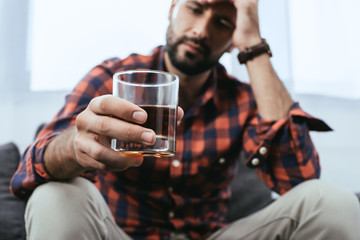People who experience chronic pain tend to seek out various substances as a means of self-medicating. One of the most popular of these substances is alcohol as it’s one of the most convenient options.
However, using alcohol for pain comes with a variety of dangers both to your physical and mental health. Many of which are worse than the pain itself.
One of the most significant risks people take when self-medicating with alcohol is an addiction. More than 6% of Americans currently faces an alcohol use disorder (AUD) and over a quarter of the population partake in binge drinking regularly.
The unfortunate truth is, most of these people don’t realize the dangers they’re presenting to themselves. The purpose of this article is to illustrate the dangers of using alcohol to self-medicate for pain.
The Effects of Alcohol on the Body
Alcohol works just like any other depressant in the sense that people build a tolerance. If you’ve taken alcohol for pain, you may have noticed the initial effects wore off the more you consumed. This is because your body has become adjusted to alcohol’s chemical influence and needs more of it to feel the relief you once felt.
The fact that you need more alcohol creates a more dangerous situation. The more you drink, the more at risk you are of alcohol poisoning, which can end in a fatal overdose.
Not to mention the numerous fatal scenarios you put yourself in by over-consuming alcohol and intoxication. When we drink alcohol, our response times, and the ability to make rational decisions becomes limited. Those who consume alcohol and get behind the wheel of a car or attempt to operate machinery are putting themselves and others at high risk for injury or death.
Furthermore, if an addiction ensues due to your self-medication, alcohol can have adverse long-term effects on your health. These include:
- Cardiomyopathy
- Cardiovascular problems (such as heart attacks)
- High blood pressure
- Liver damage (such as fatty liver disease or hepatitis)
- Stroke
- Vascular damage
- Weakening of the immune system
In rarer cases, alcohol abuse can even lead to some cancers.

The Effects of Alcohol on the Mind and Emotions
You may believe that since you’re feeling relief from your pain, you’re also helping your mind and emotional state. However, quite the opposite happens with long-term alcohol use.
Over time, it’s natural for people to develop strong, discouraging emotions, such as:
- Anger
- Anxiety
- Guilt
- Hopelessness
- Self-doubt
In fact, alcohol abuse is strongly linked to a variety of mental health conditions, including anxiety and depression. Similarly to physical pain, people take alcohol thinking it can help them overcome various emotional pains brought upon by mental illness. While the truth is alcohol only deters one’s emotional stability and worsens already present emotional pain.
Additionally, alcohol doesn’t just affect people on an individual level. If a person is drinking to overcome emotional pain, s/he is most likely taking out their negative emotions on friends and family. Even if s/he isn’t doing it intentionally.
Alcohol can find its way into other people through:
- Financial difficulties
- Social conflict
- Stress
This is extremely dangerous for both the person abusing alcohol and those around him/her. Loved ones will naturally want to help someone struggling with alcohol abuse. Yet, more often than not, they have the proper guidance to help.
A loved one may involuntarily get involved in the negative emotions brought upon by alcohol. Or a loved one might influence addiction by giving the person struggling money or a place to stay. Inevitably, people who try to help become an aspect of the addiction.
This isn’t to say you shouldn’t try to help if you know someone struggling with alcohol addiction. Rather, it’s essential to understand the proper ways to help. With the right knowledge, you can influence to curb an addiction rather than fueling it.
How to Recognize Alcohol Addiction
If you have the sense that you or someone you love is currently abusing alcohol, there are several signs to keep an eye out for. These include:
- Building a tolerance to alcohol.
- Drinking alone.
- Drinking for the sake of feeling “normal” again.
- Drinking in secret.
- Experiencing blackouts.
- Inability to control how much and when you drink.
- Favoring drinking over interests and activities you once enjoyed.
- Feeling irritable when you can’t drink.
- Feelings of compulsion and a lack of control when it comes to drinking.
- Keeping secret stashes of alcohol in various places (such as at work or in your car).
If you drink heavily, you may also notice yourself feeling uncomfortable when you’re without alcohol. This discomfort is your body withdrawing from the substance and will produce the following symptoms:
- Convulsions
- Hallucinations
- Nausea
- Shaking
- Sweating
- Vomiting
How to Get Help for Alcohol Abuse
By recognizing the signs and symptoms, you’re one step closer to finding a cure for alcohol addiction. From here, it’s crucial to receive the right treatment to begin your recovery process. For many people who struggle with an alcohol abuse disorder, medically supervised detox may be needed before entering an inpatient or outpatient rehab.
A detox will allow your body to flush out all the chemicals brought upon it by alcohol. In turn, your body will experience those uncomforting withdrawal symptoms mentioned above. In a treatment facility, medical professionals will be able to provide you with the assets to make detox as comfortable as possible.
NOTE: In some cases, detox can be fatal. Some symptoms bring about dangerous consequences, such as dehydration and vomiting. For this reason, it’s extremely important you receive professional medical guidance through detox.
Once your body is clean of alcohol, psychotherapies will allow you to overcome emotional attachments you have to drinking. This is done through a variety of techniques, such as cognitive-behavioral therapy (CBT). CBT is designed to help you better understand your thought patterns and change that for the sake of recovery. This is essential as it can prevent future relapses.
Remember, using alcohol to overcome pain will only bring on more physical and emotional pain in the long run. If alcohol use has gotten out of control for you or a loved one, it’s crucial to seek professional help as soon as possible.








